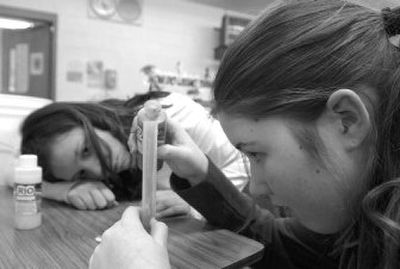After-school program pops with students

Raspberry Vanilla Fruit Punch. Marshmallow Orange. A green fruity mixture dubbed Evergreen. Such flavors are the creations of seventh-grade girls meeting weekly after school at East Valley Middle School to study the science of making soda pop.
They also work in teams to market their creations and develop Web sites.
“I like the different flavors, the sugar and fizziness and how it works together to make a good soda,” said student Janice Wright, working with Courtney Anderson to market their sodas with special ties to U.S. states. “I love creating Web sites.”
In a separate room, another group of eighth-grade girls has a murder mystery to solve while learning forensic biology and biotechnology techniques. They spend two hours each Wednesday after school on who-done-it analysis and crime scene investigation, leading up to developing a detective computer game they’ll create.
Both after-school courses are taught this year at EVMS and West Valley’s Centennial Middle School under the program Women In Biotechnology and Information Technology. It is funded through a four-year grant awarded to an educational nonprofit, Tincan, from the U.S. Department of Education, Women’s Equity Act.
WIBIT focuses on integrating biotechnology and information technology in an after-school program for middle-school girls. The project operates at Centennial on Mondays.
Tincan, based in Spokane, provides education and support for social, economic and community development for the Inland Northwest through the use of information technology and interactive media. Tincan staff provides the WIBIT curriculum, does early teaching and trains teachers to continue the programs, which are free to students.
“I really enjoy watching how they collaborate together and their curiosity,” said Tara Neumann, a Tincan instructor and director of teen programs. “It is a girl-only program. We did it to engage young women in science and to introduce them to what career opportunities are available to them.
“Inquiry-based learning is what our curriculum is based on.”
She and Fred Joslin, Tincan’s science education coordinator, have led the eighth-graders through examining different evidence bags and a detective’s report. Steps include analyzing ink from notes left at the scene compared to one mailed to a lawyer, examining suspects’ alibis, and using a kit to discover blood types.
“We have a whole kit they’re going to take and discover whose blood is on the dust cloth,” said Neumann. “It’s liquid false blood but it shows a blood type.
“They even look at Google Earth to map out distances. Could a suspect have gone here and to there during the time of the murder? Most of them have seen “CSI” and it’s interesting to hear how much they’ve picked up, but then they learn about the reality.”
“(As) they figure out who does the crime, they’re also creating a story board they’ll use to build a computer game that will be online and others can play it.”
Both groups will get to showcase their work to the community in May.
EVMS teacher Stephanie Koch, who is leading the seventh-graders, said she enjoys watching students collaborate on solutions and brainstorm while learning science.
“You can see that they’re really engaged,” Koch said. “It’s not, ”This is the curriculum you’re supposed to learn.’ This is more real-like and they can take ownership of it. I feel like I’m getting to play and experience science together with the students.”
Her group experimented with different flavors and ingredients while writing down steps and results. They made soda pop at first with dry ice and later using yeast. Teams have created sodas under the themes: Stately, Paradise, Razzadazz and Spazzsoda.
“We have a group of kids who might not otherwise interact during school who are now sharing and learning from one another,” Koch added.
Tincan plans to offer a summer camp. For more information, contact the nonprofit at 744-0972.
Screening program
Central Valley School District’s Special Services Department is conducting its annual Childfind search to identify children who should be referred for possible diagnostic assessment and recommended for appropriate services.
The search’s purpose is to identify any developmental delays in preschool children residing within the Central Valley School District. Childfind is a free screening program sponsored by the district. Screening clinics are held on a monthly basis during the school year. The areas screened are speech, language, cognitive and physical development.
Call 228-5860 for further information or to schedule an appointment.